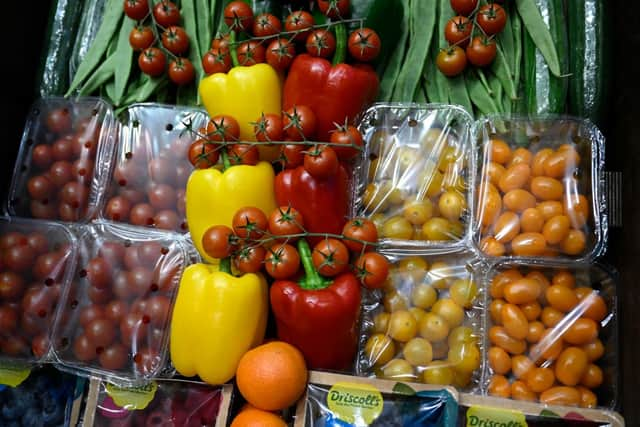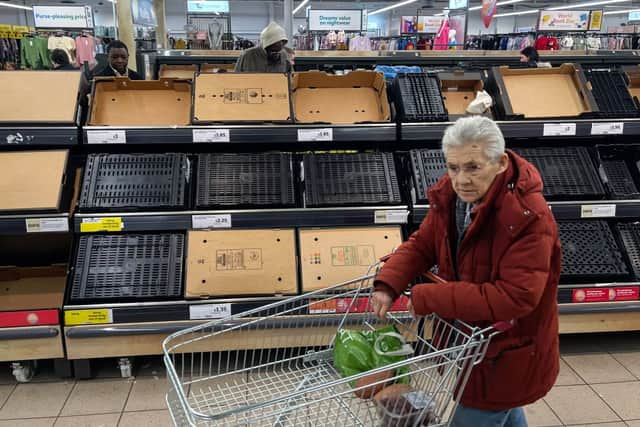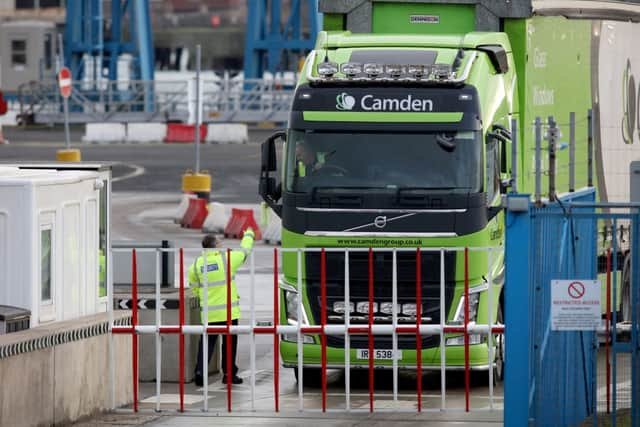Are supermarket food shortages only in the UK? Fruit and veg shortages explained, how crisis is hitting Europe
and live on Freeview channel 276
Food shortages are currently being seen across many of the UK’s biggest supermarkets, with fresh produce aisles missing many key items of fruit and veg.
Tomatoes, cucumbers and bell peppers are just some of the products that shoppers cannot get hold of. Tesco, Asda, Aldi, Morrisons and now Lidl have all introduced buying restrictions.
Advertisement
Hide AdAdvertisement
Hide AdExtreme weather in the key food producing countries Spain and Morocco has sparked a supply crisis that has been exacerbated by other structural weaknesses in the UK’s food security. Everything from how much supermarkets pay growers for their produce to the energy crisis in the wake of the Russia-Ukraine war have contributed to the issues.
Most figures in the food industry expect empty shelves will be around in some form for at least several weeks. The most pessimistic take on the current situation suggests fresh food supplies will not return to normal until May as a result of a lack of UK production. The National Farmers Union (NFU) has warned the shortages we’re seeing could prove to be “the tip of the iceberg” as a result of the UK becoming overly reliant on imports - although not everyone in the food industry shares this view.
But the UK an outlier with the food shortages it is experiencing in its supermarkets?
Why are there food shortages?
Spain and Morocco are key suppliers to most other European countries at this time of year thanks to their relatively warm and bright climates. According to the British Retail Consortium (BRC) - the trade body for most UK supermarkets - the UK imports around 95% of its tomatoes in winter, and most of them are likely to come from these two countries.
Advertisement
Hide AdAdvertisement
Hide AdBut extreme warm weather in Spain over the New Year followed by freezing temperatures in the weeks since - as well as flooding, hail and wind storms in Morocco - have damaged crops. According to Spanish growers organisation Fepex, most crops have seen significant drops in exports as a result.


The production in these two countries is usually complemented from January onwards by crops grown inside glasshouses in Northern Europe. But this fruit and veg - most of which is produced in the Netherlands - has also been in short supply.
Nigel Jenney, chief executive of the Fresh Produce Consortium - a trade body representing the entire UK food supply chain, including importers - told NationalWorld that early season production in the Netherlands is “80% down” on where it usually is. A similar lack of fruit and veg production has been reported here in the UK.
These facilities are energy-intensive as they use a lot of heat and light to beat the cold, wintery conditions on the outside. With business energy costs currently well above pre-Ukraine war levels, farming businesses have been forced to cut back production.
Advertisement
Hide AdAdvertisement
Hide AdAnother aspect behind the current shortages are UK supermarkets. In a blog post, Tim O’Malley, the managing director of Nationwide Produce - a UK-based supplier and grower, which has a presence in Spain - accused retailers of being “reluctant to move on price”, which was exacerbating the situation.
Salads and vegetables importer Paul Rowe of Poupart Imports said he had heard incidences of UK supermarkets refusing to put their prices up and Spanish “growers saying they will not be loading” their fruit and vegetables as a result.
The BRC refused to be drawn on whether supermarket prices were contributing to the crisis. But it said its members were “working with farmers to ensure that customers are able to access a wide range of fresh produce”.


Is Brexit a factor?
Many on social media have laid the blame for the food shortages at Brexit’s door. If you look at Twitter, #BrexitFoodRationing and #BrexitFoodShortages are both trending.
Advertisement
Hide AdAdvertisement
Hide AdBut while the UK’s departure from the EU has indeed created problems for our food system, it has only played a small part in theissues we’re currently seeing. Its main contribution has been an issue “with hauliers struggling to obtain UK visas for drivers” coming from Morocco, according to major supplier Thanet Earth. However, this issue is understood not to be widespread.
FPC’s Nigel Jenney says “we have yet to feel the full impact of Brexit” as full post-Brexit import checks have not yet been implemented by the UK government. What has been an issue, however, is the UK’s geographical position in relation to the rest of Europe, with crossing The Channel adding an extra layer of cost that has reportedly put some suppliers off sending their fresh produce to the UK.


Do other countries have food shortages?
While the UK food industry has its own unique problems that are contributing to this crisis, it is not the only country in Europe to be struggling with food shortages related to the issues seen in Spain and Morocco.
Retailers in Ireland have reported similar issues with products like tomatoes, cucumbers and peppers. These include stores run by Tesco Ireland, Lidl, and SuperValu. While the situation is not as acute as in the UK, the country’s farmers have urged their government to provide more support for growers.
Advertisement
Hide AdAdvertisement
Hide AdSupply issues have also been reported at Danish retailers Coop and Rema 1000. But it is understood that neither retailer is rationing items in the same way as is being seen in the UK.
While European consumers are seeing relatively normal levels of stock, the tighter amount of supply coming out of Spain and Morocco is driving up prices. As of last week, average German shelf-prices for courgettes were at a four-year high of €2.78 per kilogram - although, they had been running well below the prices from previous years for the initial weeks of 2023. There have also been fewer promotions running on tomatoes.
Comment Guidelines
National World encourages reader discussion on our stories. User feedback, insights and back-and-forth exchanges add a rich layer of context to reporting. Please review our Community Guidelines before commenting.
